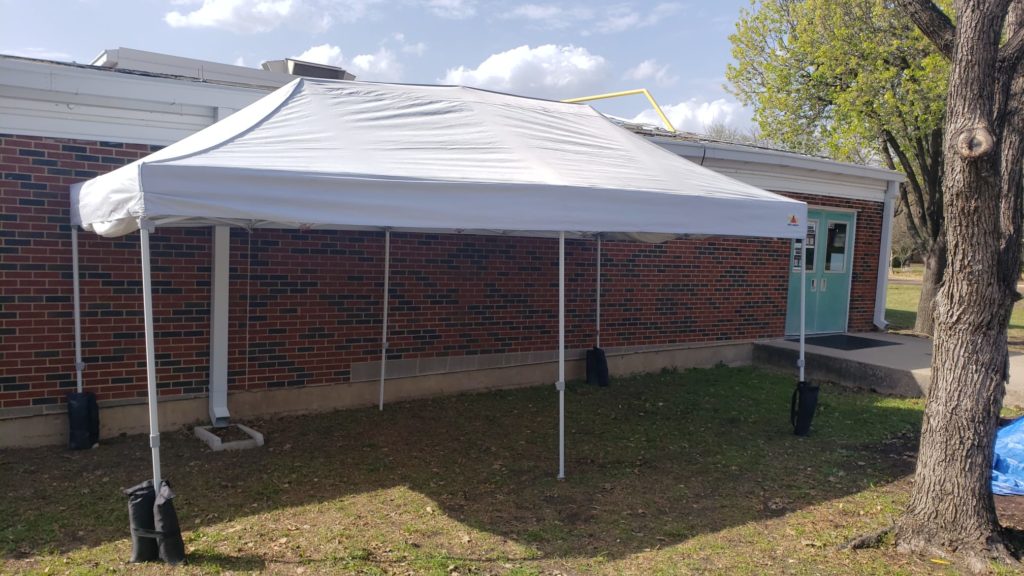Tents are a staple at outdoor events, providing a versatile and practical solution for creating a sheltered space in an open area. However, while they may seem straightforward, there are many factors to consider when using tents effectively.
When renting a tent, you need to consider the appropriate size for the number of guests, choose the right type of tent for different weather conditions, and ensure proper installation to prevent accidents.
5 Things to consider when renting a tent
Tents and weather
One common issue when using tents is the effect of weather on their suitability. While tents can provide shelter from light rain or sun, they may not be suitable for more extreme weather conditions. For example, high winds can cause tents to become unstable, while heavy rain or snow can cause leaks or even collapse. Therefore, it’s essential to choose a tent appropriate for the specific weather conditions you are expecting and to be prepared to adjust your plans if conditions change.
Tents that are poorly installed
Another issue that can arise is the improper installation of tents. If tents are not installed correctly, they can pose a safety risk to those attending the event. Therefore, it’s vital to ensure that tents are installed by professionals with experience and training and to follow all manufacturer’s guidelines for installation and use.
The tent size
One key factor to consider when using tents is the appropriate size for the event’s guests. It’s important to choose a tent that is large enough to accommodate all guests comfortably while still leaving enough space for tables, chairs, and any other equipment or decorations that will be used. It’s better to choose a slightly larger tent than necessary to ensure everyone has enough space and avoid a cramped atmosphere.
How many square feet of tent space do I need for my guests?
A general rule of thumb can be used to estimate the tent size needed based on the number of guests expected at an event. This rule suggests that each person requires approximately 10-12 square feet of tent space.
For example, if you expect 100 guests, you need a tent with between 1,000 and 1,200 square feet of space. This calculation includes space for tables, chairs, and other equipment that may be necessary, in addition to space for guests to stand or move around.
However, it’s important to note that this is just a general guideline. The actual size of the tent needed may depend on several factors, including the type of event, the layout of the space, and the kind of equipment or activities planned for the event.
Suppose you need to decide what size tent you need for your event. In that case, it’s always a good idea to consult a professional tent rental company that provides guidance and recommendations based on your specific needs and event requirements.
Tent types
Choosing the correct type of tent for the event is also essential. Various tent styles and materials are available, each with advantages and disadvantages. Here are some of the most common types of tents and their pros and cons:
- Pole Tents: These tents have a high center pole supporting the canopy, with guy ropes extending from the top to anchor points around the tent. Pole tents are ideal for weddings and other formal events, as they have a classic, elegant look. They are also relatively easy to set up without heavy equipment. However, they are unsuitable for events with limited space or high winds.
- Frame Tents: These tents have a metal frame that supports the canopy, with no center pole. Frame tents are ideal for events with limited space, as they can be installed in small areas and connected to other tents to create a larger space. They are also more stable in high winds than pole tents. However, frame tents are generally more expensive than pole tents and require heavy equipment for installation.
- Pop-up Tents: These small, lightweight tents can be quickly set up and taken down. They are ideal for smaller events or as a temporary shelter for outdoor activities like camping or picnics. Pop-up tents are also affordable and easy to transport. However, they are less durable than other types of tents and are unsuitable for events with large numbers of people.
- Clearspan Tents: These tents have a sturdy frame and no center pole, allowing for maximum use of interior space. They are ideal for events with large numbers of guests, as they can be customized to fit the size and layout of the event space. Clearspan tents are also suitable for all weather conditions, as they are designed to withstand high winds and heavy rain. However, they are generally more expensive than other types of tents and require heavy equipment for installation.
Tents are here to stay. You will keep seeing them at weddings, festivals, or at any professional stall. We invite you to consult us at Salut Rental Events; we will help you realize your small-gathering vision.

